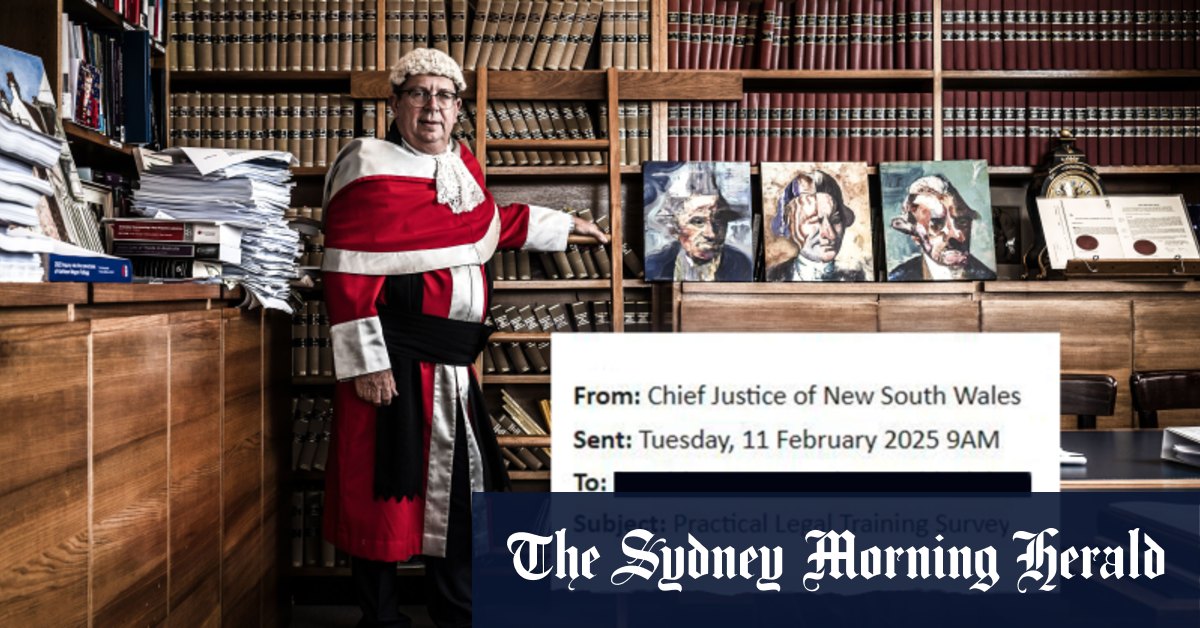Australia
College of Law singled out by NSW top judge in letters to lawyers

Introduction: Financial Overview and Concerns About Practical Legal Training (PLT)
The College of Law, a not-for-profit institution, has come under scrutiny following revelations about its significant financial surplus over the past decade. In a speech, Chief Justice Andrew Bell expressed surprise at the College’s “surplus” of nearly $16 million annually and its accumulated retained earnings of almost $180 million. While the College recently reduced its course fees to $9,200 this year, Bell remains concerned about the high cost of Practical Legal Training (PLT) courses, which have increased substantially over the past decade. These concerns are shared by Court of Appeal Justice Tony Payne, who chairs the Legal Profession Admission Board (LPAB). The LPAB has commissioned an independent survey by Urbis to gather data on PLT delivery, costs, and the assessment of practical skills. The survey aims to inform potential reforms or improvements to the PLT system.
Financial Scrutiny and Transparency Issues
The College of Law’s financial statements have raised eyebrows, particularly regarding the compensation for key management personnel. In 2024, total compensation for these individuals amounted to $2.01 million, though the College did not disclose how many personnel received this amount. When questioned about these figures, the College stated that its financial statements comply with ASIC regulations and declined to provide further details on individual salaries. This lack of transparency has likely fueled concerns about the College’s financial management and its prioritization of resources. Despite these concerns, the College maintains that it values feedback from stakeholders and regularly conducts surveys and interviews to improve its PLT program.
The Survey and Its Objectives
The Urbis survey, initiated by the LPAB, seeks to address the rising cost of PLT and the effectiveness of its delivery. The survey’s primary goal is to collect data that can guide reforms or improvements to the PLT system. Beyond cost, the survey also explores the profession’s views on the mode of delivery for PLT and the methods used to examine and assess practical skills. This initiative reflects broader concerns within the legal profession about the affordability and quality of legal education, particularly for early-career lawyers. By engaging with stakeholders, including students, educators, and practitioners, the LPAB hopes to ensure that PLT programs are both accessible and effective in preparing graduates for the challenges of legal practice.
The College’s Response and Commitment to Improvement
In response to the scrutiny, the College of Law has emphasized its commitment to continuously refining its PLT program. The institution has stated that it is open to reviewing the survey results and collaborating with stakeholders to achieve the best outcomes for the profession. This collaborative approach signals the College’s willingness to adapt to evolving needs and address concerns about the affordability and quality of legal education. However, the College’s decision to reduce course fees to $9,200 this year, while a step in the right direction, may not be sufficient to alleviate concerns about the overall cost of PLT. The institution’s long-planned leadership transition, with the retirement of CEO Neville Carter, adds another layer of change as the College navigates these discussions.
The Law Society of NSW’s Perspective
The Law Society of NSW has also weighed in on the issue, acknowledging the importance of “effective and affordable” PLT to ensure that graduate lawyers are “practice ready.” President Jennifer Ball has emphasized the need for high-quality career support and guidance for early-career lawyers, identifying this as a key priority for her 2025 term. The Society looks forward to the results of the LPAB’s survey and is committed to seeking input from the profession on how to equip early-career lawyers with essential skills such as critical thinking and legal knowledge. This focus on practical readiness aligns with broader efforts to enhance the quality of legal education and address the challenges faced by new entrants to the profession.
Conclusion: The Path Ahead for Legal Education
The discussions surrounding the College of Law’s finances and the cost of PLT highlight the broader challenges facing legal education in Australia. While the College has taken steps to reduce fees and engage with stakeholders, concerns about affordability and transparency persist. The Urbis survey, initiated by the LPAB, represents a crucial opportunity to gather insights and drive meaningful reforms to the PLT system. As the legal profession continues to evolve, the ability to provide accessible, high-quality training will be essential for ensuring that future lawyers are well-prepared to meet the demands of practice. The collaboration between the College, the LPAB, and the Law Society of NSW offers a promising foundation for achieving these goals and addressing the concerns of all stakeholders.
-

 Money3 days ago
Money3 days agoConsumer Financial Protection Bureau Adds Error Message To Home Page
-

 Australia1 day ago
Australia1 day agoTropical Cyclone Zelia intensifies to category 2 storm
-

 Money2 days ago
Money2 days agoWinning Content Strategies For Wealth Managers
-

 Asia1 day ago
Asia1 day agoWhat you need to know about 2024 YR4, the asteroid that could hit Earth in about eight years’ time
-

 Entertainment17 hours ago
Entertainment17 hours agoPrince Harry and Meghan Markle’s Best Moments and Photos From the 2025 Invictus Games
-

 Australia11 hours ago
Australia11 hours agoTropical Cyclone Zelia intensifies to category five system off Pilbara coast
-

 Politics1 day ago
Politics1 day agoDozens of religious groups sue to stop Trump admin from arresting migrants in places of worship
-

 Entertainment3 days ago
Entertainment3 days agoEvery Celebrity Who Attended the 2025 Super Bowl: A Guide to the A-Listers at the Big Game










